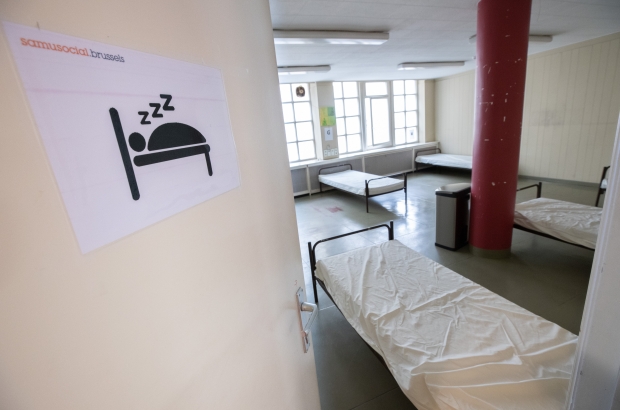- Daily & Weekly newsletters
- Buy & download The Bulletin
- Comment on our articles
'Workload is unsustainable': Aid organisations struggle to help homeless
More than 50 Brussels-based homeless relief organisations went on strike for an hour on Wednesday to draw attention to the immense pressure that the sector is facing.
The symbolic action is the most significant one taken in years, Bruzz reports, reflecting the severity of the stress and exhaustion workers are currently dealing with.
“In a normal year, we can take in around 60 to 70 people and find them new homes on average within six months,” said Deborah Oddie, director of the Escale-Onderweg shelter in Saint-Gilles.
“Last year, it took an average of nine months and our waiting list grew to more than 800 people. The group on the streets is growing, but so are the waiting times to get help. As a result, frustrations are increasing. And these also reach our staff.”
That comes in the form of insults, verbal abuse and even threats of physical violence, said Oddie.
“In the past year, five of my colleagues dropped out,” said Oddie. “I was barely able to find replacements. Salaries in the sector are not exuberant, but there’s also a lack of rest periods and supervision. Many social workers need psychological counselling themselves.”
Almost the entire Brussels aid sector of reception homes, centres for general welfare work and other service providers took part in the hour-long work stoppage. Medical services and emergency shelters such as those of the Red Cross did not participate.
“Our target audience needs continuous assistance,” explained another homeless association director, Daan Vinck.
“This is symbolically important. We’re showing that the urgency is high to effectively change the policy.”
Apart from increasingly difficult and stressful working conditions, the sector is also grappling with a shortage of workers and a population of homeless and vulnerable people that is only increasing in the Belgian capital.
There are more than 7,000 homeless people in Brussels and another 415,000 Brussels residents are at risk of extreme poverty.
“Sector staff are constantly working at the cutting edge and are exhausted by the scale of the problems and the lack of solutions,” said homeless administration Bruss'Help, which supports the participating organisations.
There is not only a lack of emergency shelters, according to Bruss’Help, but also of affordable housing to direct people to and psychological help for those who are struggling, all of which comes on top of the ongoing asylum crisis.
“Crisis after crisis, with no respite for our teams on the ground – this leads to high staff turnover and difficulties in recruiting new staff,” Bruss’Help said.
The organisation sent an open letter on behalf of all participating organisations to Brussels prime minister Rudi Vervoort (PS) and federal prime minister Alexander De Croo (Open VLD) “because we notice that the situation remains unresolved as long as everyone keeps pointing at each other”, a spokesperson said.
Yet just as these organisations are sounding the loudest alarm they have in years and the demand for their services rises, the Schaerbeek homeless centre Train Hostel is due to close at the end of March.
More than 100 vulnerable people, including children with chronic diseases and pregnant women, will be added to the growing list of those needing help.
“There are no alternatives, as all shelters in Brussels have reached their capacity,” said Pierre Van Heddegem, Belgian director of Médecins du Monde.
The centre, run by the French-speaking Red Cross, only opened on 1 April last year. Its doors will close the same day the Brussels winter plan for the homeless expires because, according to the centre managers, the federal and Brussels governments no longer have the financial resources to subsidise its operation.
It is the second emergency homeless shelter to close so far this year, following the shuttering of an emergency shelter in Anderlecht that packed up after only two months of operation. More than 180 single men ended up on the streets in early March as a result of its closure.
“Despite our repeated requests to the federal government, justified by the intense pressure on reception in Brussels, the federal government refuses to extend the subsidy throughout the year,” said the office of minister Alain Maron (Ecolo), responsible for homeless shelters in Brussels.
"As for the region, which has doubled its budgets in this sector, all budgetary capacities were already deployed in favour of several thousand shelter solutions.
"With the active help of Bruss'Help, we will also continue to ensure that the most vulnerable people find a place as much as possible in existing shelters."


















